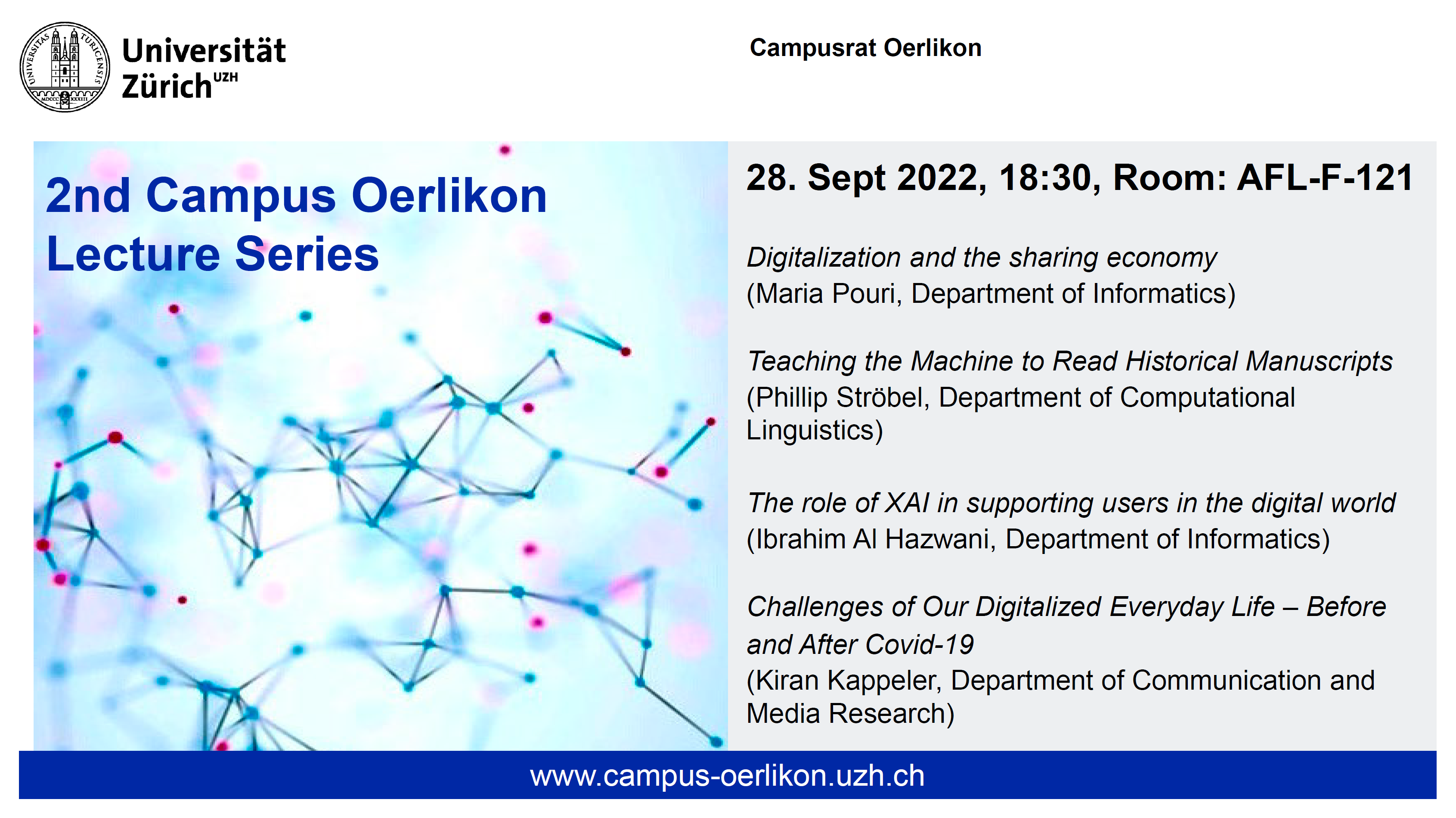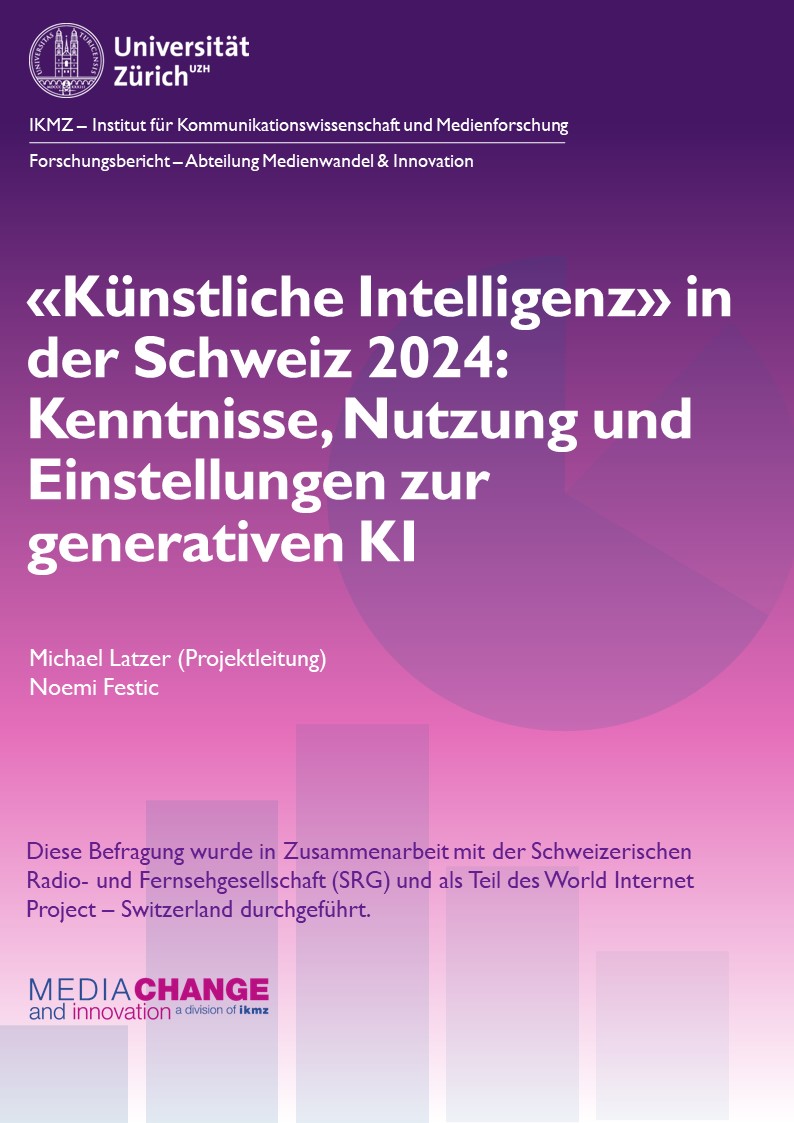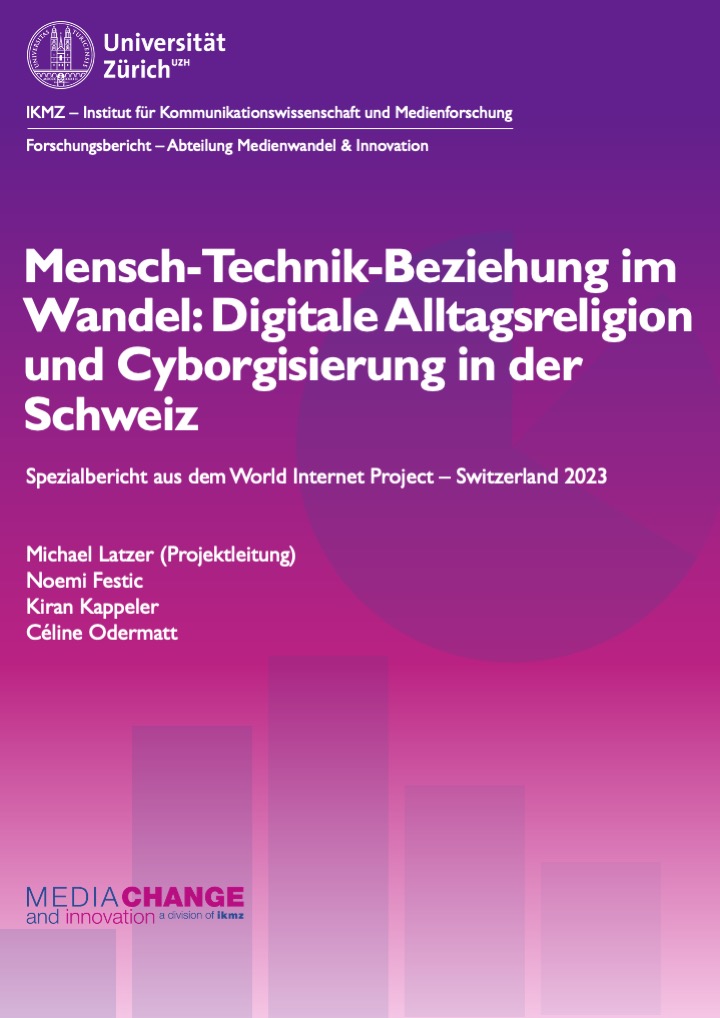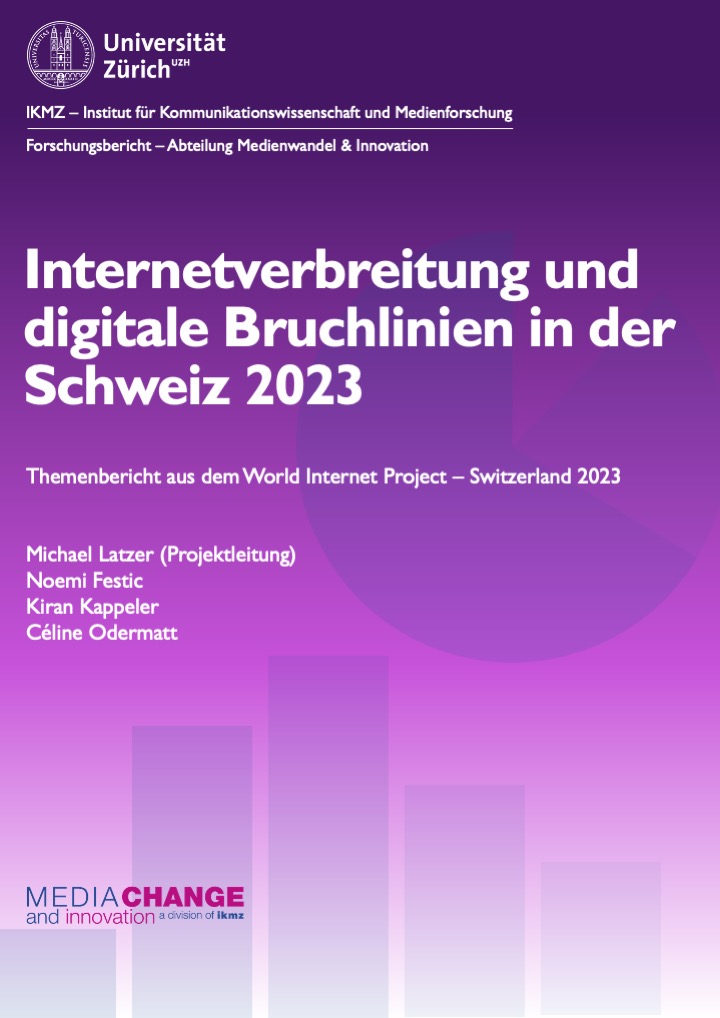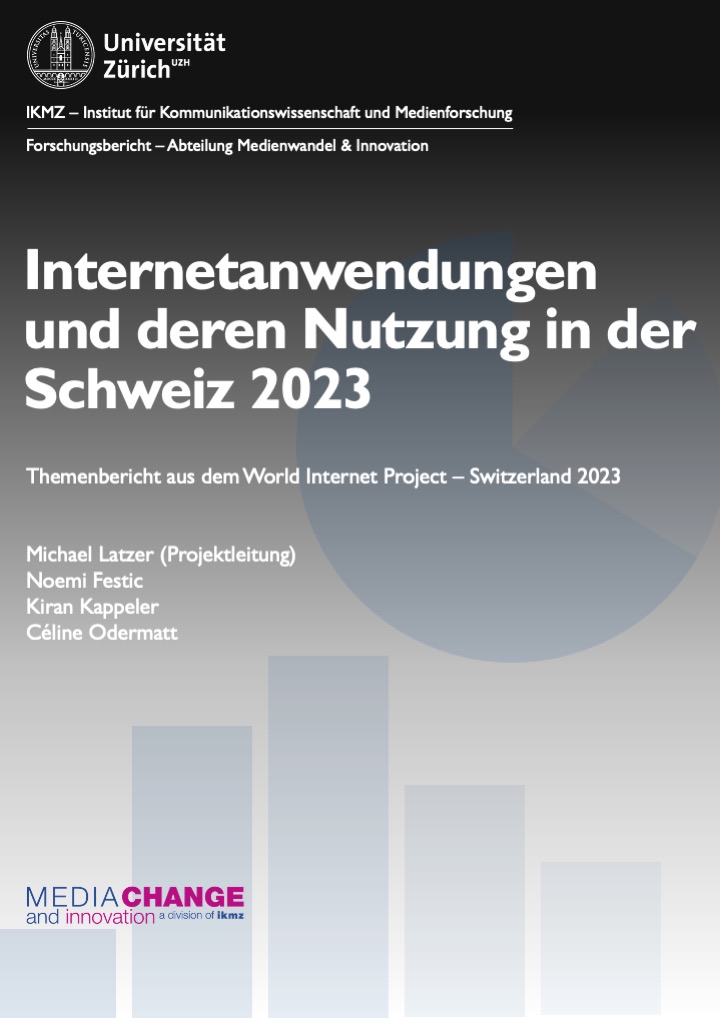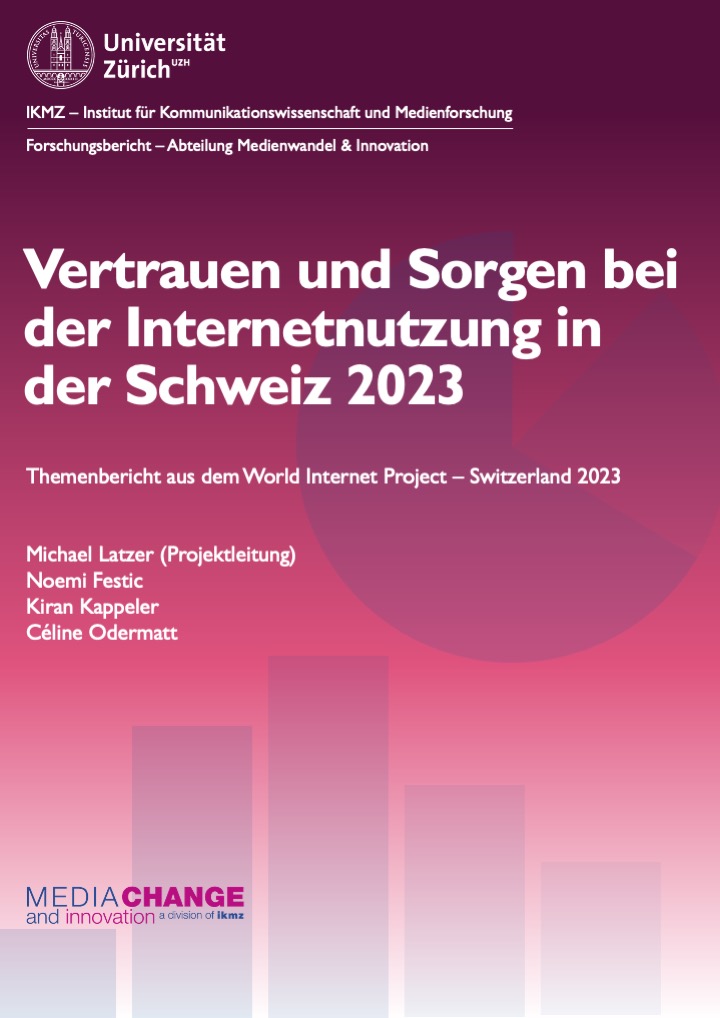News
-
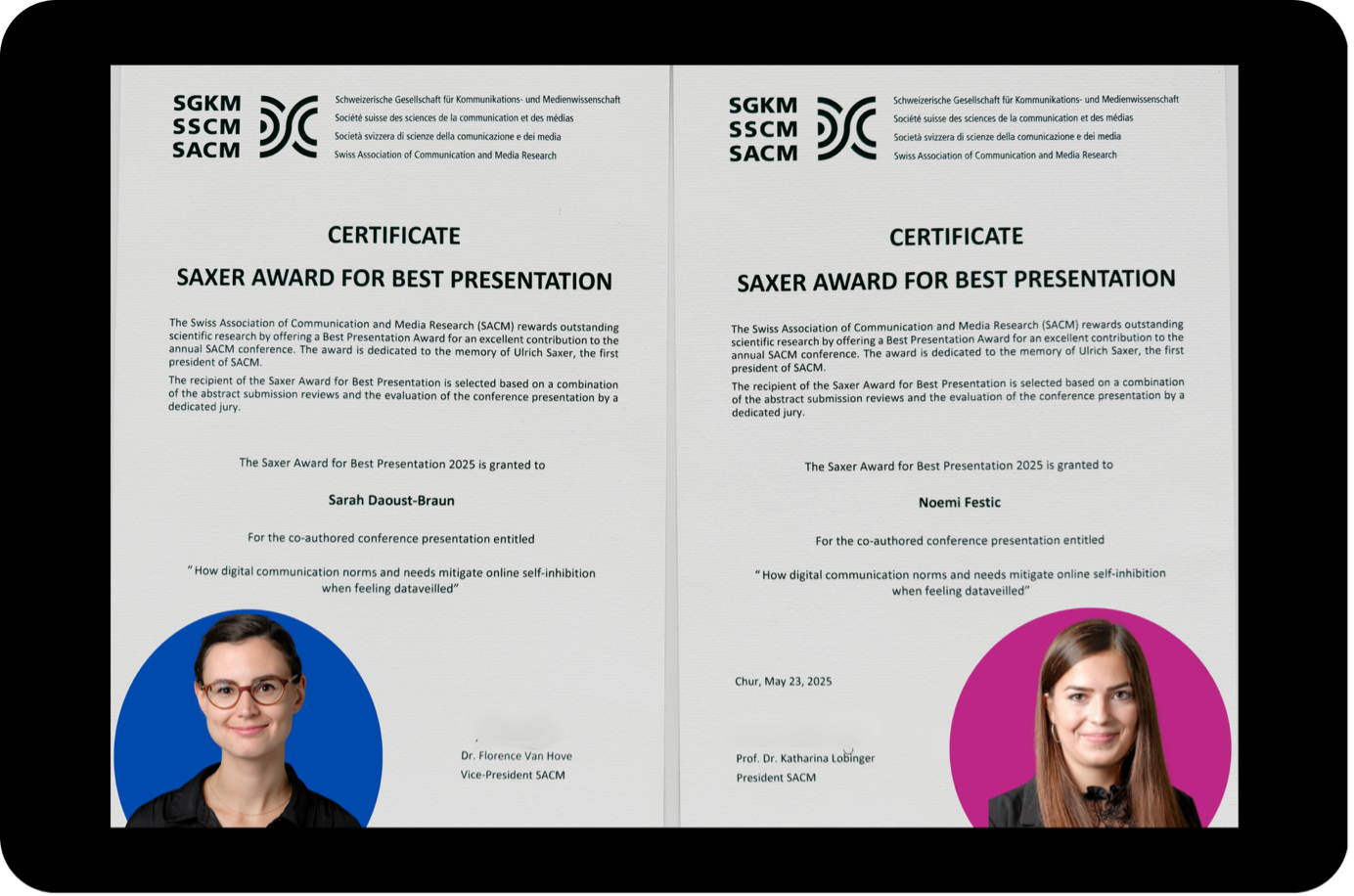
We are proud to celebrate two special recognitions awarded at the 2025 Swiss Association of Communication and Media Research (SACM) Annual Conference last week in Chur.
Our team members Sarah Daoust-Braun and Noemi Festic received the Saxer Award for Best Presentation for their work on how motives for digital communication mitigate the chilling effects of dataveillance. This research is part of the Media Change & Innovation Division’s project The Chilling Effects of Dataveillance: Conceptual Advances and Empirical Evidence for Switzerland, funded by the Swiss National Science Foundation.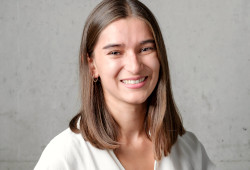
Our former team member Kiran Kappeler, now a postdoctoral researcher at the Center for Tracking and Society at the University of Copenhagen, was also honored with the Dissertation Award for her outstanding cumulative dissertation entitled “Negotiating Digital Technology Use in the Highly Digitized Swiss Society – A Mixed-Method Analysis of the Digital Practices of Individuals.”
Kiran’s doctoral work is based on her collaboration in three Media Change & Innovation Division’s projects: The Chilling Effects of Dataveillance: Conceptual Advances and Empirical Evidence for Switzerland and The Significance of Algorithmic Selection for Everyday Life: The Case of Switzerland, both funded by the Swiss National Science Foundation, as well as the World Internet Project - Switzerland.
We warmly congratulate them for their well-deserved achievements! -
“Artificial Intelligence” in Switzerland 2024: Rapid Diffusion and Increasing Digital Inequality
21st November 24This report examines how the current technological developments in “Artificial Intelligence,” specifically generative AI based on large language models (e.g., tools like ChatGPT), have been integrated into the daily lives of the Swiss and what they think about them.
Rapid diffusion: Within a year and a half of launch, AI tools are known across Switzerland, with half the population and nearly all of the young using them
Nearly all Swiss internet users (98%) have heard of AI tools, a figure that has increased since 2023 (79%). Half of Swiss internet users (54%) have already used AI tools. Among the youngest age group, nearly everyone (93%) has tried AI tools, with 43% using them frequently. In contrast, in the oldest age group, only 8% use them frequently, while almost three-quarters (72%) have never used them. The use of AI tools has risen by 17 percentage points since mid-2023 (2024: 54%, 2023: 37%).
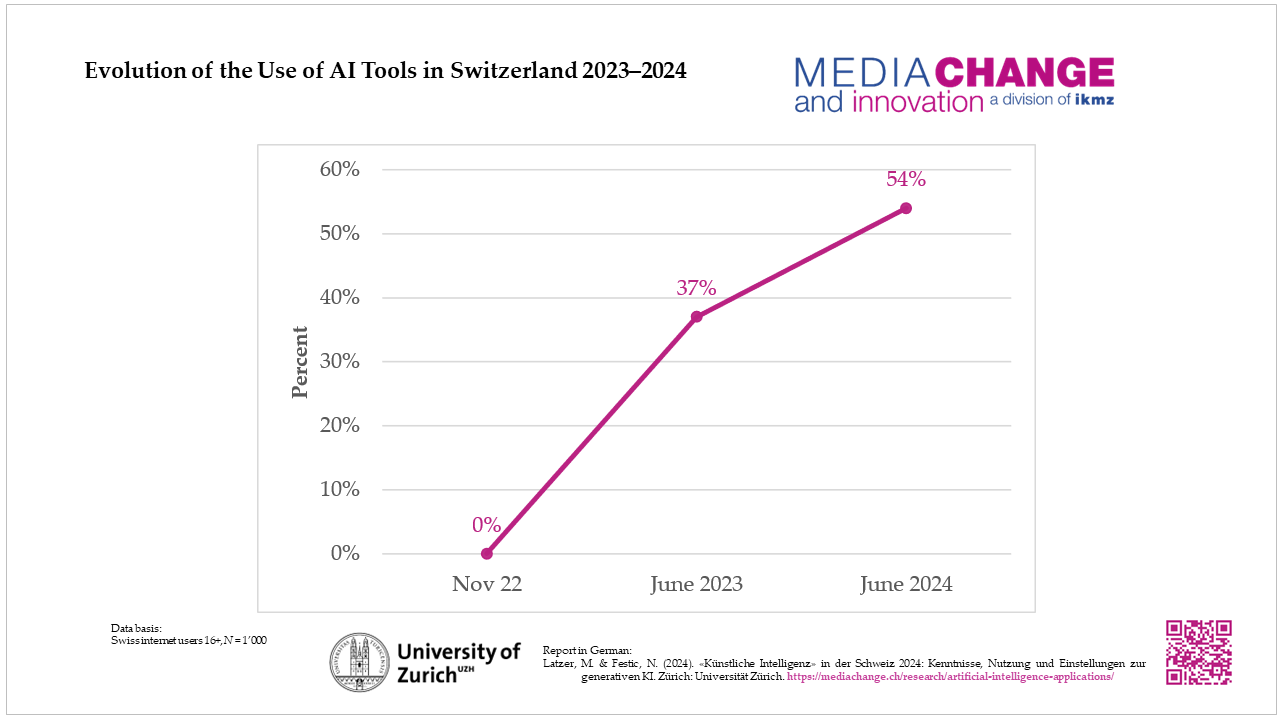
Digital inequalities in the Swiss society by age and education are amplified by Artificial Intelligence
Knowledge of AI tools is significantly higher among younger age groups (61% among the youngest vs. 7% among the oldest). Younger individuals are also much more likely to be AI users (ages 16–29: 93%, ages 70+: 24%). Additionally, the proportion of users rises sharply with increasing levels of educational attainment (low: 37%, medium: 42%, high: 70%).
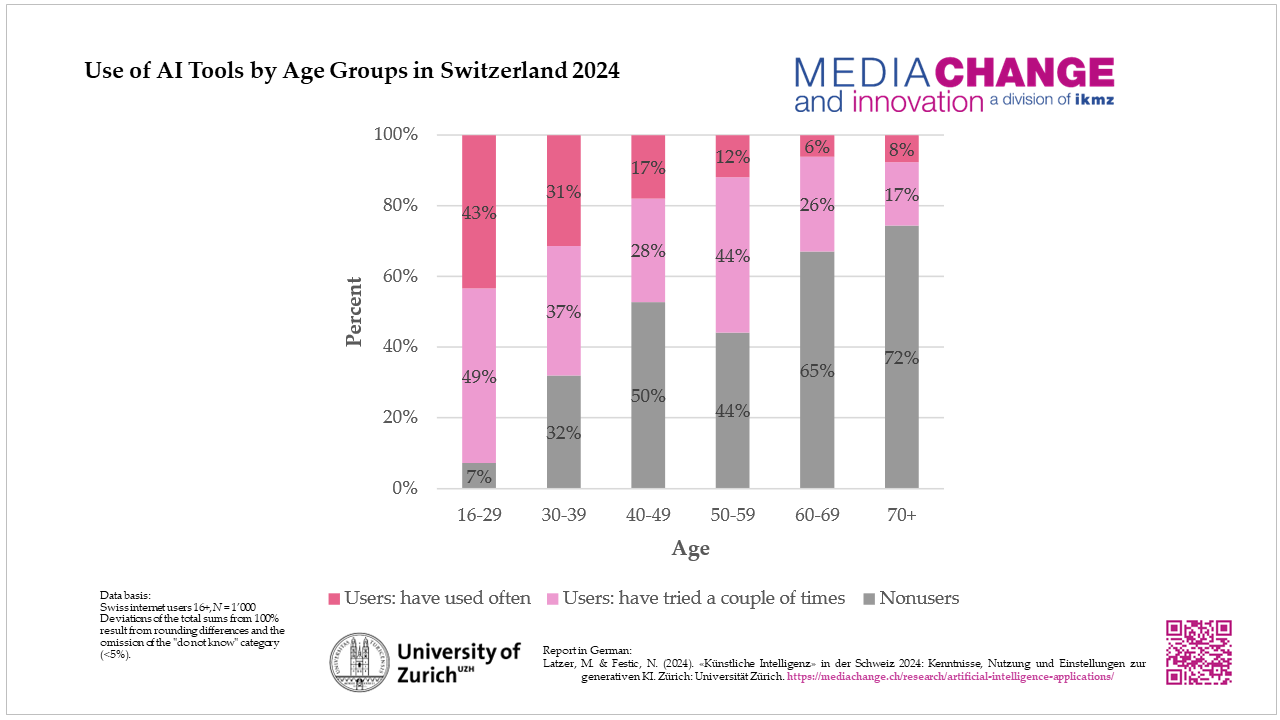
Early signs of saturation; Incorrect information from AI tools is the main reason for non-use
There appears to be a certain level of saturation in the adoption of AI tools: 77% of current non-users consider it (very) unlikely that they will use AI tools in the next six months. The most common reason for non-use is that "generative AI often produces incorrect information" (mean = 4.01). An almost equally important reason is that AI tools have little relevance to the daily lives of respondents (mean = 3.93).
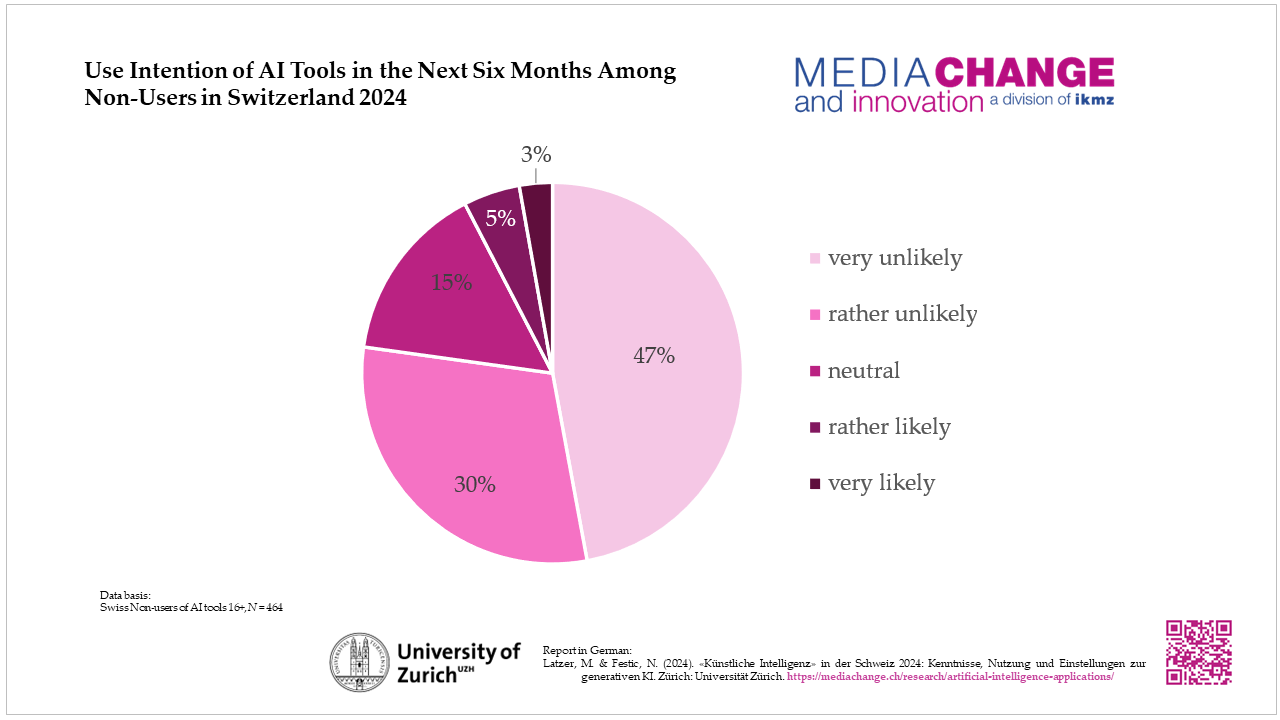
Half of Swiss internet users are skeptical about children using AI tools; AI users, younger people, and men view it more positively
Half (54%) of Swiss internet users aged 16 and older believe that children should not have access to AI tools. A third (33%) support access, and 13% are undecided. Younger individuals, men, and AI users are more likely to support children using AI tools.
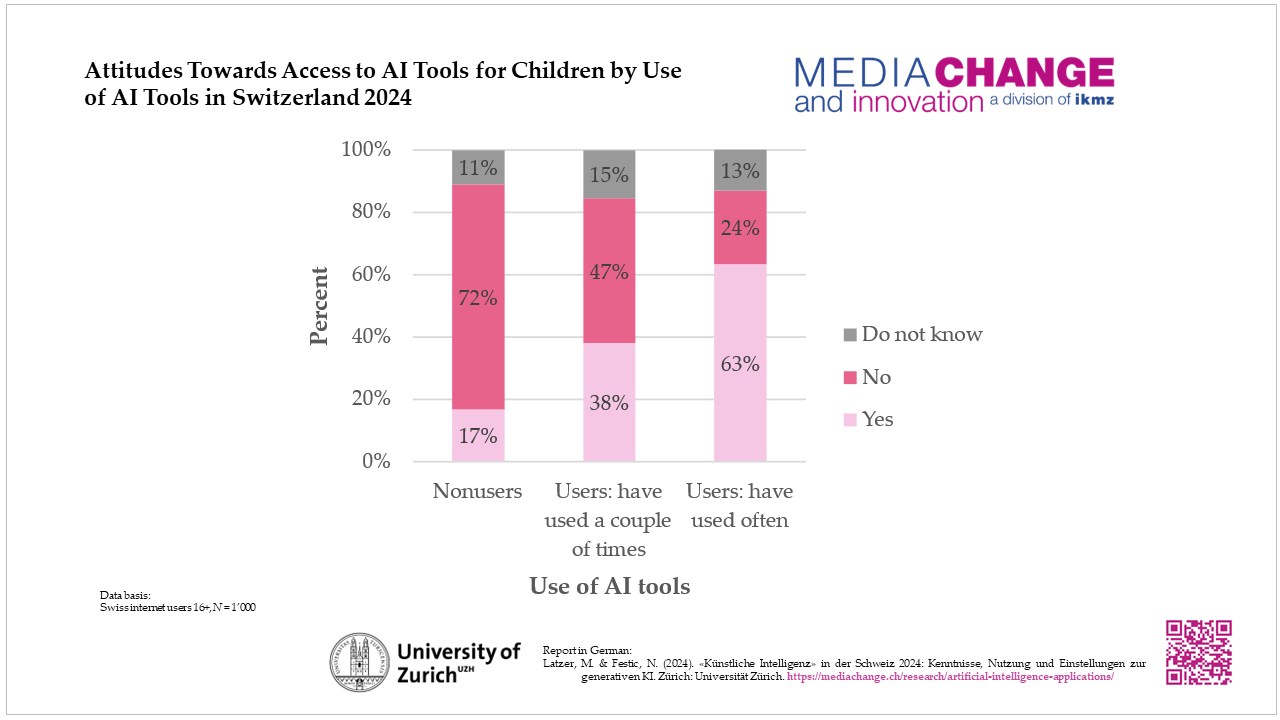
As part of the World Internet Project – Switzerland, we collaborated with the Swiss public broadcasting association (SRG) to collect nationally representative data on the use and implications of these AI tools. As part of their repeated “Wie geht’s, Schweiz?” survey that is concerned with the well-being of the Swiss population in various areas of life (politics, personal finances, work, relationships, etc.), the data was collected in May and June 2024.
The results are available in the report and the news release in German and English. The English version of the report will be published soon.
- «Künstliche Intelligenz» in der Schweiz 2024: Kenntnisse, Nutzung und Einstellungen zur generativen KI
- News Release “Artificial Intelligence” in Switzerland 2024 (in German)
- News Release “Artificial Intelligence” in Switzerland 2024 (in English)
Infographics
- Evolution of the Use of AI Tools in Switzerland 2023-2024 (English/German)
- Use of Al Tools by Age Groups in Switzerland 2024 (English/German)
- Use Intention of Al Tools in the Next Six Months Among Non-Users in Switzerland 2024 (English/German)
- Attitudes Towards Access to AI Tools for Children by Use of Al Tools in Switzerland 2024 (English/German)
-

Our team member Kiran Kappeler successfully defended her cumulative dissertation on July 10th. We warmly congratulate her on this significant accomplishment.
Her outstanding dissertation includes four peer-reviewed articles and is entitled “Negotiating Digital Technology Use in the Highly Digitized Swiss Society—A Mixed-Method Analysis of the Digital Practices of Individuals.”
Kiran has been working in the Media Change & Innovation Division as a Research and Teaching Associate since September 2019. She will continue her work as a Senior Research and Teaching Associate over the following months. We wish her great success in her next career steps.
-
Internet Use as Everyday Religion on the Rise, Cyborgization Still in its Early Stages
16th November 23
The next generation of digital technology is spreading in Switzerland: Artificial intelligence has already arrived, cyborg technologies for self-optimization have not yet. Especially among younger people, internet use is becoming an everyday digital religion. These are results of the World Internet Project – Switzerland 2023.Chatbots with artificial intelligence (AI) such as ChatGPT or Bard are already widespread in Switzerland: 8 in 10 internet users (79%) have already heard of them and half of those (37%) have already either tried (18%) or used them multiple times (19%). Younger and more highly educated people know of and use these services particularly often. “The high level of awareness and use of ChatGPT and similar AI applications is surprising, especially since they have only been available since the end of 2022,” emphasizes Michael Latzer, professor of Media Change and Innovation at the University of Zurich.
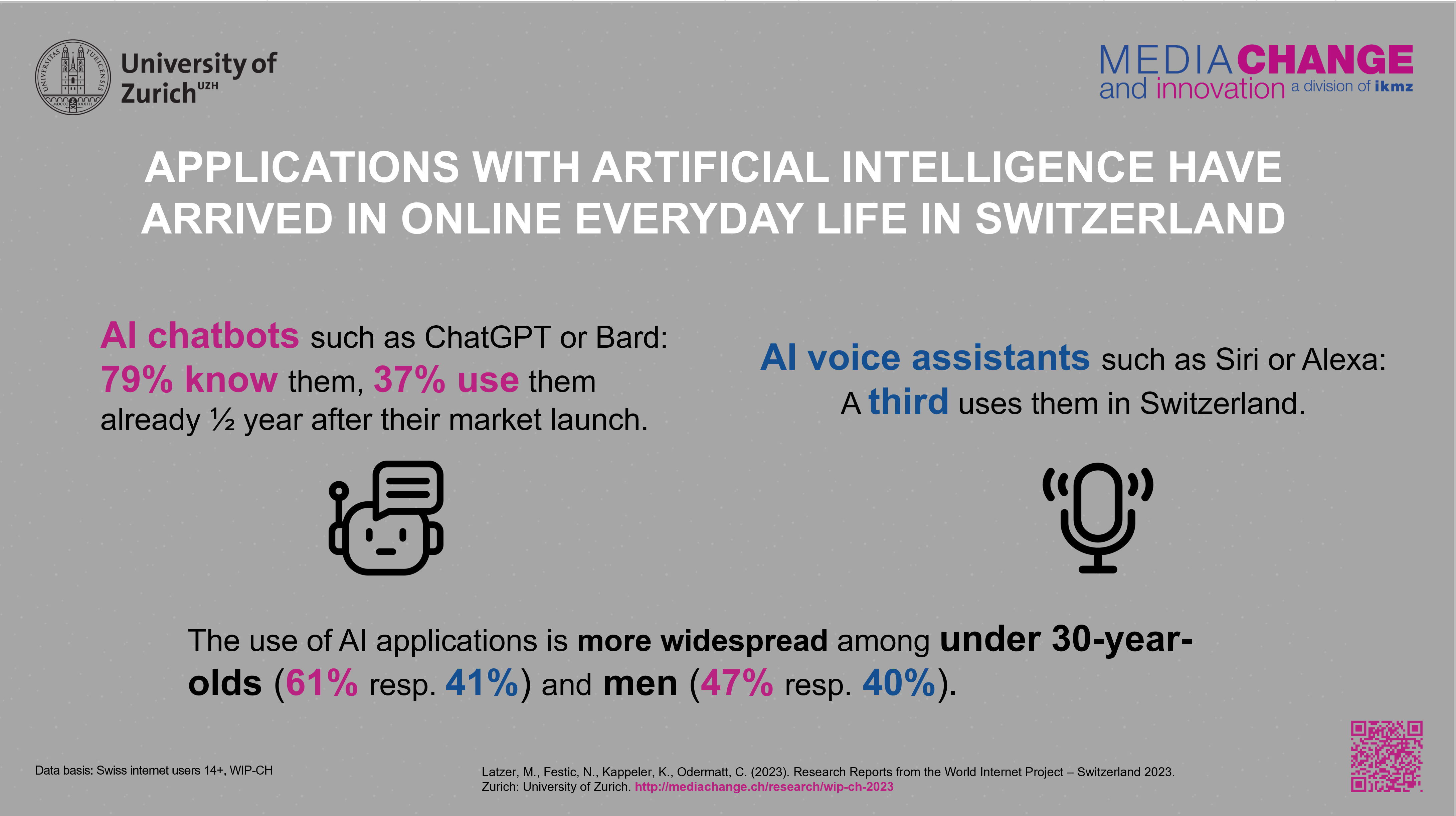
Clear indications of a religion-like digitalization
Digitalization is giving rise to a new social form of religion – an everyday digital religion. The everyday use of digital services fulfills similar social functions as traditional religions, e.g., reducing complexity, creating meaning or social cohesion. Just under a third of the population (30%) think that suggested content in social networks or health and well-being apps is controlled by an inexplicable, higher instance. For a quarter of the population (27%), internet use has become a kind of ritual: they start and end their day with it. Between 10% and 19% of internet users report transcendental experiences that exceed the usual boundaries of everyday life.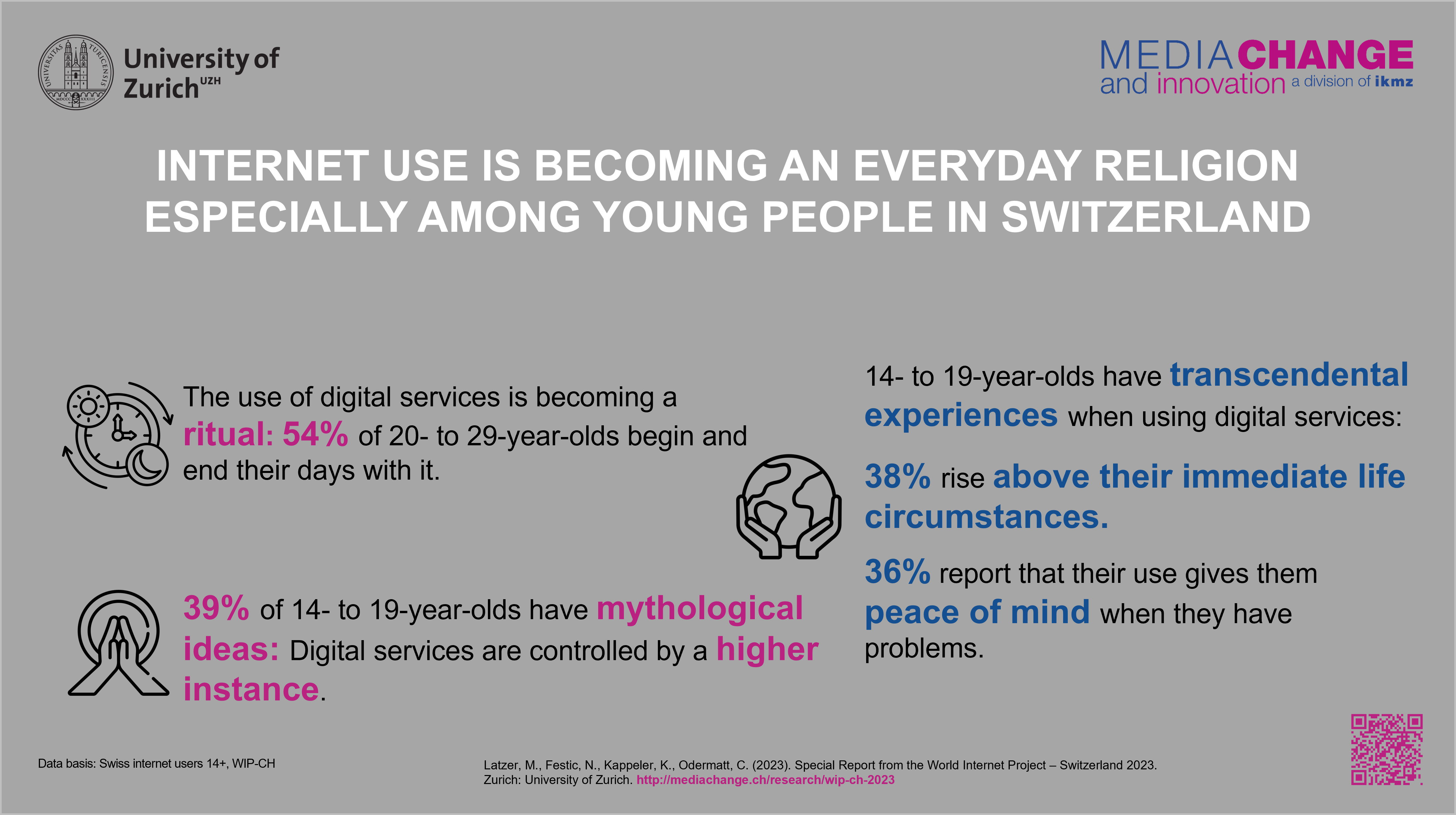
Cyborgization is still in its infancy
The merging of humans and technology known as cyborgization reinforces the religious nature of digitalization. Cyborg technologies are used to achieve transhumanist goals, i.e., overcoming human limitations and thus also reaching divine characteristics such as omniscience and eternal life. The study examines non-medically required cyborg technologies for self-optimization such as stick-on patches for electronic brain stimulation or chips implanted in the hand for making payments. They are used to improve physical and mental abilities, exceed biological limits and thereby increase longevity and well-being.A good third of the Swiss online population is familiar with cyborg technologies attached to the body (37%) or implanted in the body (35%). Their distribution is currently low and lies in the low single-digit percentage range. However, 4 out of 10 internet users believe that they could make their everyday life much more convenient by using them (39%). At the same time, there is a high level of risk awareness, particularly with regard to cybercrime (78%) and privacy breaches (70%).
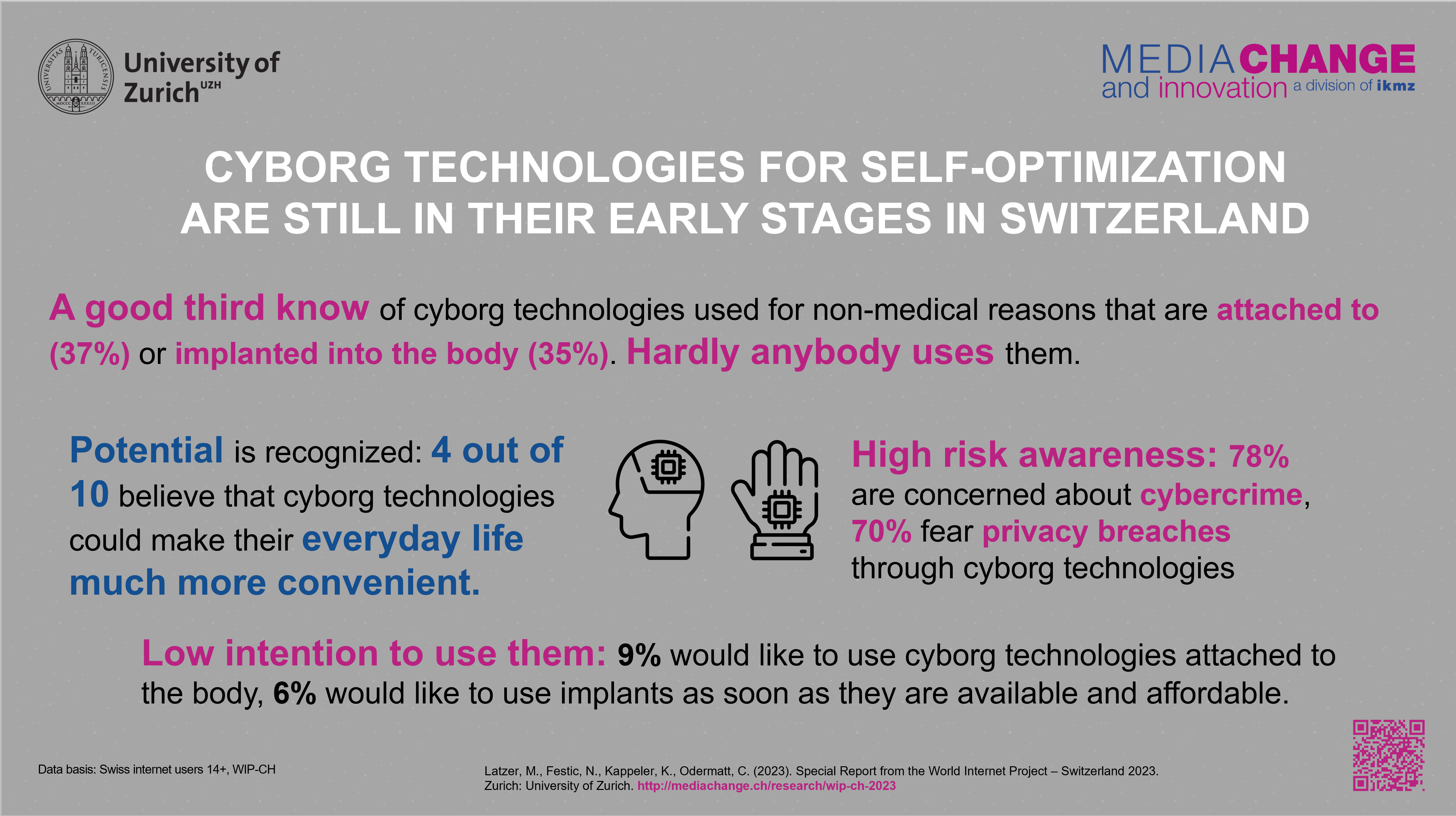
- News Release WIP-CH 2023 (in English)
- News Release WIP-CH 2023 (in German)
- News Release WIP-CH 2023 (in French)
- News Release WIP-CH 2023 (in Italian)
The full results can be accessed below in four research reports (in German) and 6 infographics.Special Report 2023: Everyday digital religion and cyborgization
Research Reports 2023 (Themenberichte)
- Internetverbreitung und digitale Bruchlinien in der Schweiz
- Internetanwendungen und deren Nutzung in der Schweiz
- Vertrauen und Sorgen bei der Internetnutzung in der Schweiz
Infographics

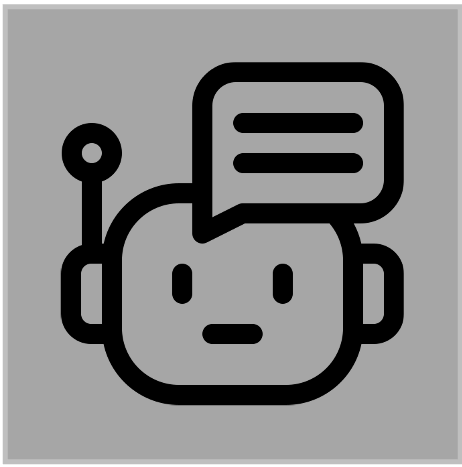



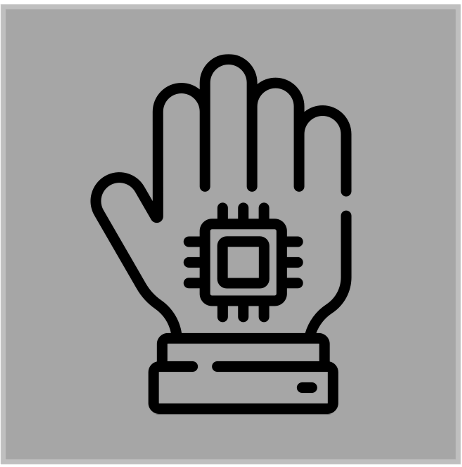
- Internet use is becoming an everyday religion especially among young people in Switzerland (English / German)
- Applications with artificial intelligence have arrived in online everyday life in Switzerland (English / German)
- Pandemic-related digitalization pushes make lasting change on everyday life in Switzerland (English / German)
- Switzerland is optimistic about the internet (English / German)
- Increasing chilling effects due to perceived online surveillance in Switzerland (English / German)
- Cyborg technologies for self-optimization are still in their early stages in Switzerland (English / German)
Icons made by Freepik, Ehtisham Abid, monkik and juicy_fish from www.flaticon.com
-
Michael Reiss successfully defended his cumulative dissertation
7th November 23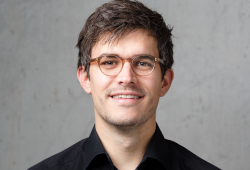
Our former team member, Michael Reiss, successfully completed his doctoral studies at the end of October. He defended his cumulative dissertation entitled “News must die for news to live. Empirical, methodological, conceptual, and theoretical perspectives on contemporary news consumption and a proposal for a normative turn.”
Michael worked for the Media Change & Innovation Division for five years. He recently joined the Leibniz Institute for Media Research | Hans-Bredow-Institut in Hamburg as a postdoc.
We congratulate him on this important achievement and wish him every success in this new stage in his career.
-
Daniela Jaramillo-Dent elected to ICA Board of Directors
18th October 23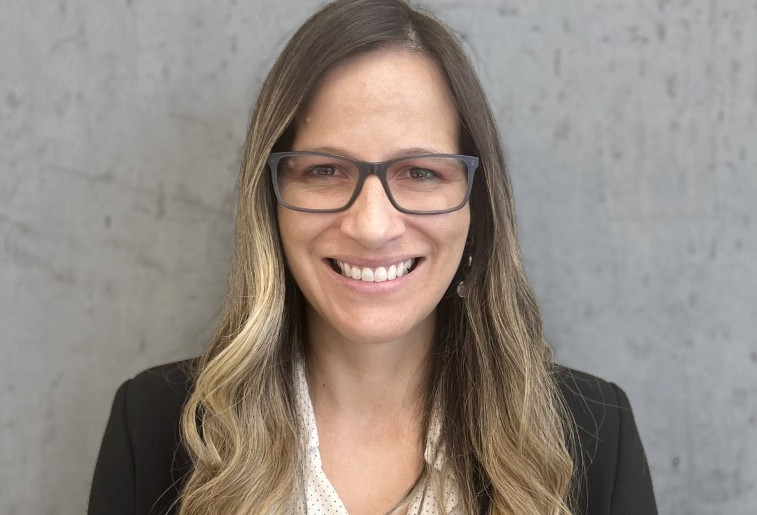
Our team member Daniela Jaramillo-Dent will join the Board of Directors of one of the most important associations in communication and media research. She was elected Board Student and Early Career Representative of the International Communication Association (ICA) in October 2023.
Daniela will begin her two-year term in June 2024 on the closing day of the annual ICA conference, which will take place in Australia. She will support student and early career members through various initiatives and represent them at the Board of Directors meetings. She currently serves as the Student and Early Career Representative for the ICA Intercultural Communication Division.
The Media Change & Innovation Division warmly congratulates Daniela for her election. We wish you good luck in your new role!
-

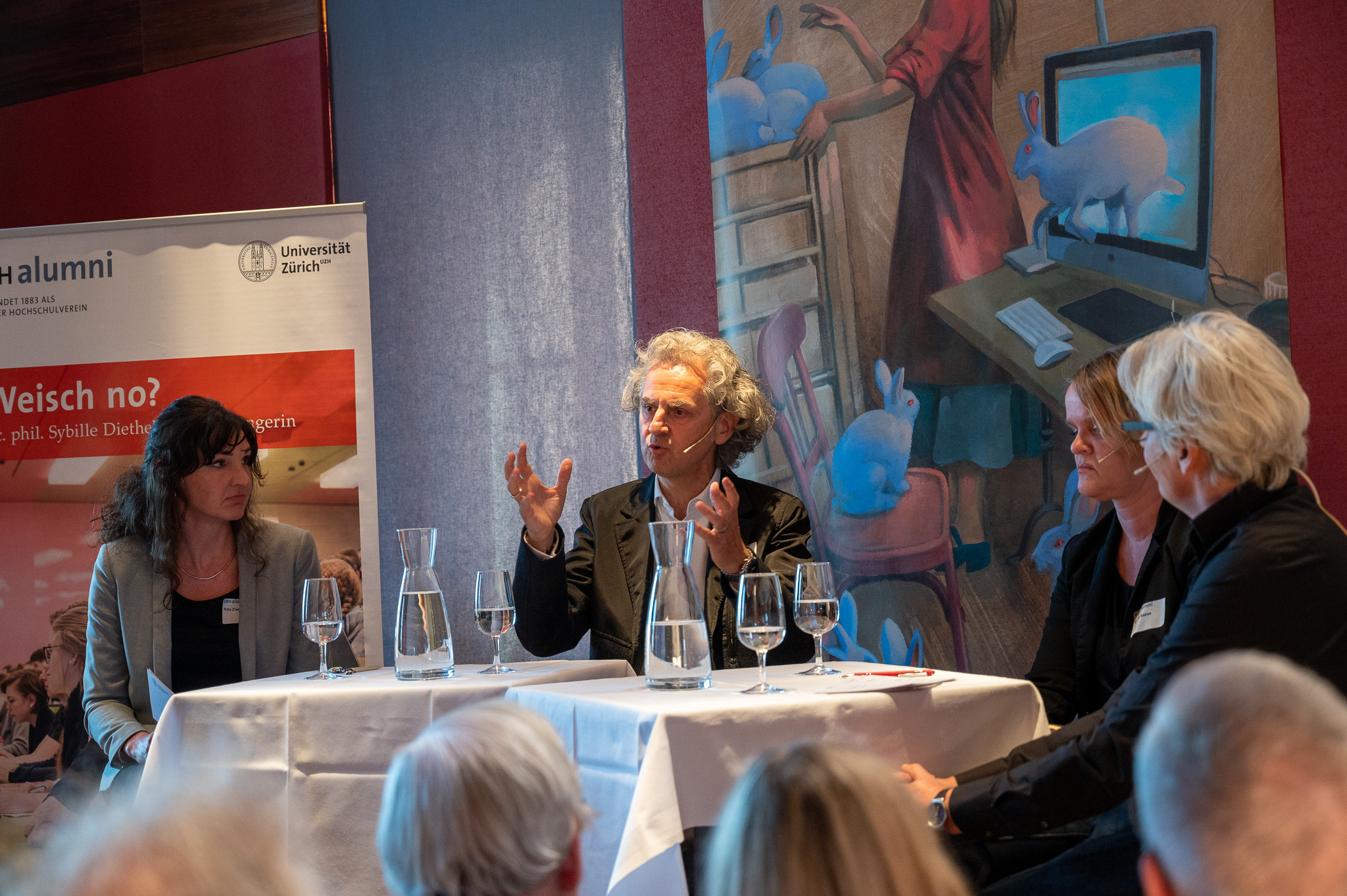
Foto von UZH Alumni
Vor zwei Wochen fand der gut besuchte Talk im Turm, organisiert von UZH Alumni statt. Michael Latzer und die Slavistin Sylvia Sasse diskutierten hier zum Einfluss von Desinformation und Algorithmen auf die Meinungsbildung. Wer das Event verpasst hat, findet hier eine Zusammenfassung und kann den ganzen Talk sogar im Podcast nachhören.
-
DSI Apéro Philo Session: Digital Wellbeing
2nd May 23Next week on 11th of May, Michael Latzer and Noemi Festic are giving a talk at the Digital Society Initiative of the University of Zurich at the Apéro Philo Session. The talk is titled: Digital Wellbeing: Conceptualization, Empirical Results, Challenges. This will be the first installment of this new format and aims to facilitate discussions in a more relaxed, friendly, and inclusive environment. Consequently, the talk is followed by a discussion and an Apéro.
You find more information and can register here: https://ethics.dsi.uzh.ch/project/apero-philo/
-
Am 18.04.2023 von 18.15 - 19.30 Uhr findet im Restaurant UniTurm ein Gespräch unter dem Titel "Göttliche Algorithmen und Putins Desinformation" statt. Neben anderen Gästen wird Michael Latzer hierbei darüber sprechen wie Digitalisierung und Desinformation Wahrnehmung und Weltbilder von Menschen beeinflussen. Ticketverkauf und weitere Infos gibt es hier: https://uzhalumni.ch/events/102271
-
Campus Oerlikon Lecture Series: Digital Worlds
22nd September 222nd Campus Oerlikon Lecture Series: Digital Worlds
On Wednesday, 28th of September, 2022 Kiran Kappeler gives a talk on ‘Challenges of Our Digitalized Everyday Life – Before and After Covid-19’ as part of the 2nd Campus Oerlikon Lecture Series- The overarching theme of the lecture series is ‘Digital Worlds: Research on Digitalization and Digitalized Research’. The event starts at 6:30 pm at Affolternstrasse 56 at the University of Zurich (Room: AFL-F-121) and is followed by an Apéro. For more information see: https://www.campus-oerlikon.uzh.ch/de/projekte-campus-oerlikon/veranstaltungen/vortragsreihe-HS22.html
